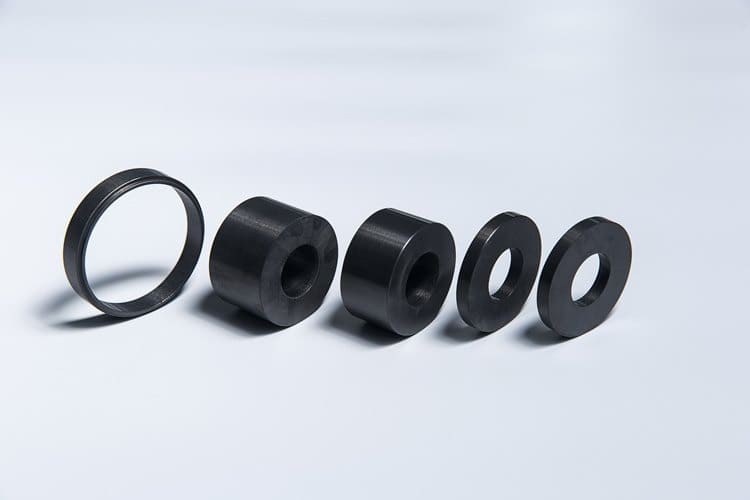Silicon Nitride Ceramics: Properties for Engineering Applications
Introduction
Silicon nitride ceramics (Si₃N₄) are advanced non-oxide ceramics known for their exceptional mechanical strength, thermal stability, and corrosion resistance. Available in grades like Gas Pressure Sintered (GPS) Si₃N₄ and Hot-Pressed Silicon Nitride (HPSN Si₃N₄), these materials are ideal for engineering applications in industries such as automotive, aerospace, and manufacturing. This article details the key properties of silicon nitride ceramics, supported by a comparative table, to highlight their suitability for engineering solutions.
Properties of Silicon Nitride Ceramics
Silicon nitride ceramics offer a range of mechanical, thermal, electrical, and chemical properties, making them suitable for demanding engineering applications. Below are their primary characteristics:
- High Mechanical Strength: Flexural strength ranges from 800 MPa (GPS Si₃N₄) to 900 MPa (HPSN Si₃N₄), ideal for load-bearing components.
- Excellent Thermal Stability: Thermal shock resistance up to 800°C (HPSN Si₃N₄), suitable for high-temperature environments.
- Superior Electrical Insulation: Volume resistivity exceeds 10¹⁴ ohm-cm, ensuring reliability in electronic systems.
- Corrosion Resistance: Minimal weight loss in harsh chemicals (e.g., 0.1 mg/cm² in H₂SO₄), perfect for aggressive environments.
- Fracture Toughness: Ranges from 6.5 to 7 MPa m¹/², enhancing durability under stress.
Detailed Properties Table
The table below compares the properties of silicon nitride ceramics across GPS Si₃N₄ and HPSN Si₃N₄ grades.
| Property | GPS Si₃N₄ | HPSN Si₃N₄ |
| Main Characteristics | ||
| Color | Black | Black |
| Main Applications | Wear resistance, corrosion resistance | Wear resistance, corrosion resistance |
| Characteristics | High toughness, insulation, corrosion resistance | High toughness, insulation, corrosion resistance |
| Mechanical Properties | ||
| Bulk Density (g/cm³) | 3.2 | 3.25 |
| Water Absorption (%) | 0 | 0 |
| Vickers Hardness (GPa) | 15 | 16 |
| Flexural Strength (MPa) | 800 | 900 |
| Compressive Strength (MPa) | 3000 | 3500 |
| Young’s Modulus (GPa) | 300 | 320 |
| Poisson’s Ratio | 0.27 | 0.27 |
| Fracture Toughness (MPa m¹/²) | 6.5 | 7 |
| Thermal Properties | ||
| Thermal Conductivity (W/mK) | 25 | 30 |
| Thermal Shock Resistance (ΔT°C) | 700 | 800 |
| Coefficient of Thermal Expansion (10⁻⁶/K) | 3.2 | 3.2 |
| Electrical Properties | ||
| Volume Resistivity (ohm-cm) | >10¹⁴ | >10¹⁴ |
| Dielectric Constant (1 MHz) | 8 | 8 |
| Dielectric Strength (kV/mm) | 18 | 18 |
| Chemical Properties | ||
| Weight Loss in H₂SO₄ (mg/cm²) | 0.1 | 0.1 |
| Weight Loss in NaOH (mg/cm²) | 0.2 | 0.2 |
Table Notes:
- Mechanical Strength: HPSN Si₃N₄’s higher flexural strength (900 MPa) and compressive strength (3500 MPa) make it suitable for heavy-duty applications.
- Thermal Properties: HPSN Si₃N₄’s enhanced thermal shock resistance (800°C) supports extreme temperature applications.
- Chemical Resistance: Both grades show excellent corrosion resistance, ensuring durability in harsh environments.
Conclusion
Silicon nitride ceramics offer exceptional mechanical strength, thermal stability, and corrosion resistance, making them ideal for engineering applications in automotive, aerospace, and manufacturing industries. The differences between GPS Si₃N₄ and HPSN Si₃N₄ grades allow for tailored solutions in demanding environments.
Advanced Ceramics Hub is a leading manufacturer and supplier of high-quality silicon nitride ceramics products in forms of plates, sheets, rods, tubes, crucibles, substrates, and customized parts, offering customized solutions for various industrial and research applications.

